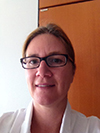
Contributions
Abstract: EP1715
Type: Poster Sessions
Abstract Category: Therapy - Others
Background: These last years, evolution of diagnosis criteria and development of disease modified treatment have complicated medical care of Multiple Sclerosis (MS) patients and require collaboration between neurologist and MS expert center. Telemedecine emerged as an adequate system to effective optimize care for MS patients in the whole of Normandy.
Objective: Equality of access for all MS patient to a medical expertise by development of TeleSEP, a specific platform of MS tele-expertise
Method: First step: creation of téléSEP plateform in partnership with expert neurologist and GCS normand'e-santé (Regional grouping of support for the deployment of e-health) for designer and project manager, with prior approval of health regional agency, a public funding organization. Secondly, implementation of teleSEP in all neurologist, private or hospital, with accordance with IT services. Final step: user training. All MS patient electronic record included an interfacing sheet, an informative sheet, EDMUS graph and upload MRI. Traceability is provided by final report written by expert neurologist within 3 days of the meeting.
Result: Twelve teleSEP took place with 107 discussed MS cases (mean: 8.23+/-4.13 per teleSEP). Total participants of meetings were significantly increased with an average of 21.15+/-9.07, with 12.17 present (+/-5.65) and 10.75 connected (+/-4.14). Participants are neurologists but also residents. Characteristics of patients were: 72% of female, mean age: 44.90 years (+/- 12.45), mean EDSS: 3.17 +/- 2.28 [0-8], mean disease duration: 118.02 months (+/- 112.02) and relapsing-remitting form for half of them. There were two main queries about diagnosis and/or treatment respectively in 51% and 84% of cases. Global satisfaction score assigned by users is 4.51/5 with download time of data less than 30 minutes. Another important points are save valuable time and costs due to absence of travel for neurologist or patient to expert center, with less pollution. Recommandations of teleSEP were applied in 97% of cases.
Conclusion: TeleSEP allows equality of access for all patient to a medical expertise regardless of location and neurologist in terms of diagnosis and treatment with global improvement of care to the region. It's practical tool with global satisfaction, professional training and applicable to other diseases.
Disclosure: Derache: received funding for speakers honoraria from Merck-Serono, Biogen-Idec, Novartis, Teva, Roche and Sanofi-Genzyme.
Defer: received personalcompensation for scientificadvisoryboardfromBiogenIdec, Novartis, Genzymeand TevapharmaceuticalIndustries Ltd and has receivedfundingfor traveland/or speaker honorariafromMerckSerono, BiogenIdec, Novartis, Genzymeand TevapharmaceuticalIndustries Ltd.
Branger: received funding for speaker honoraria from Biogen, Novartis, Sanofi-Genzyme and Merck.
Seguin, Leroux, Hauchard: nothing to disclose
Abstract: EP1715
Type: Poster Sessions
Abstract Category: Therapy - Others
Background: These last years, evolution of diagnosis criteria and development of disease modified treatment have complicated medical care of Multiple Sclerosis (MS) patients and require collaboration between neurologist and MS expert center. Telemedecine emerged as an adequate system to effective optimize care for MS patients in the whole of Normandy.
Objective: Equality of access for all MS patient to a medical expertise by development of TeleSEP, a specific platform of MS tele-expertise
Method: First step: creation of téléSEP plateform in partnership with expert neurologist and GCS normand'e-santé (Regional grouping of support for the deployment of e-health) for designer and project manager, with prior approval of health regional agency, a public funding organization. Secondly, implementation of teleSEP in all neurologist, private or hospital, with accordance with IT services. Final step: user training. All MS patient electronic record included an interfacing sheet, an informative sheet, EDMUS graph and upload MRI. Traceability is provided by final report written by expert neurologist within 3 days of the meeting.
Result: Twelve teleSEP took place with 107 discussed MS cases (mean: 8.23+/-4.13 per teleSEP). Total participants of meetings were significantly increased with an average of 21.15+/-9.07, with 12.17 present (+/-5.65) and 10.75 connected (+/-4.14). Participants are neurologists but also residents. Characteristics of patients were: 72% of female, mean age: 44.90 years (+/- 12.45), mean EDSS: 3.17 +/- 2.28 [0-8], mean disease duration: 118.02 months (+/- 112.02) and relapsing-remitting form for half of them. There were two main queries about diagnosis and/or treatment respectively in 51% and 84% of cases. Global satisfaction score assigned by users is 4.51/5 with download time of data less than 30 minutes. Another important points are save valuable time and costs due to absence of travel for neurologist or patient to expert center, with less pollution. Recommandations of teleSEP were applied in 97% of cases.
Conclusion: TeleSEP allows equality of access for all patient to a medical expertise regardless of location and neurologist in terms of diagnosis and treatment with global improvement of care to the region. It's practical tool with global satisfaction, professional training and applicable to other diseases.
Disclosure: Derache: received funding for speakers honoraria from Merck-Serono, Biogen-Idec, Novartis, Teva, Roche and Sanofi-Genzyme.
Defer: received personalcompensation for scientificadvisoryboardfromBiogenIdec, Novartis, Genzymeand TevapharmaceuticalIndustries Ltd and has receivedfundingfor traveland/or speaker honorariafromMerckSerono, BiogenIdec, Novartis, Genzymeand TevapharmaceuticalIndustries Ltd.
Branger: received funding for speaker honoraria from Biogen, Novartis, Sanofi-Genzyme and Merck.
Seguin, Leroux, Hauchard: nothing to disclose


